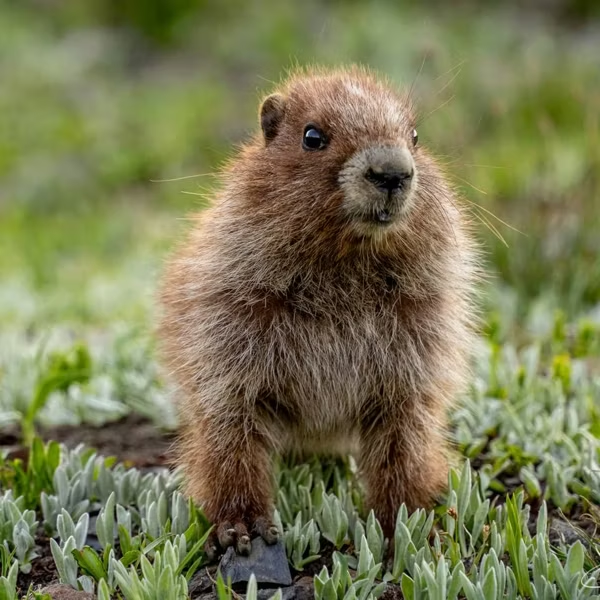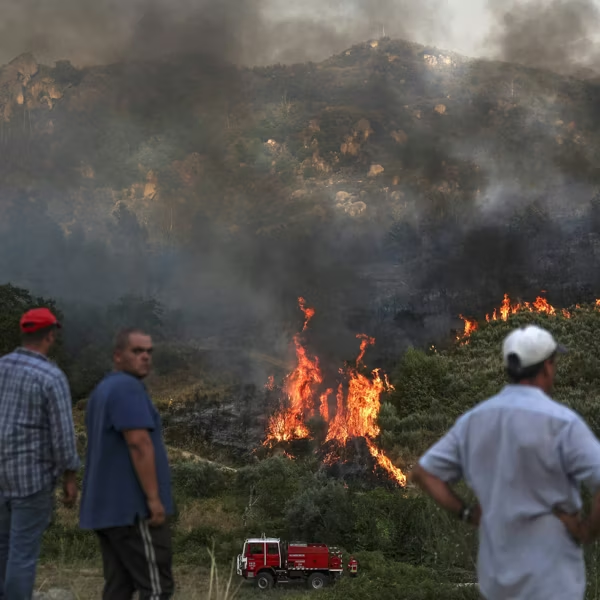Fall of the Wild: Study Documents 'Catastrophic Decline' in World's Untouched Places
With 10 percent lost in just 20 years, researchers say wilderness is being lost at a 'staggering' pace
Wilderness, though remote by nature, is not immune to the ravages of humanity. In fact, according to a new study in the journal Current Biology, the world's wild places are undergoing "catastrophic decline" and could be facing elimination within decades if monumental policy shifts are not implemented.
"If we don't act soon, there will only be tiny remnants of wilderness around the planet, and this is a disaster for conservation, for climate change, and for some of the most vulnerable human communities on the planet," warned lead author Dr. James Watson, of the University of Queensland in Australia and the Wildlife Conservation Society in New York. "We have a duty to act for our children and their children."
Watson and his team mapped wilderness areas around the globe, which were defined as "biologically and ecologically intact landscapes free of any significant human disturbance," and then compared that to one produced by the same methods in the early 1990s.
The amount of wilderness loss in those two decades was "staggering," according to co-author Dr. Oscar Venter of the University of Northern British Colombia.
The study reported total losses of 3.3 million km2 since the 1990s, particularly in South America, which experienced 29.6 percent loss, and Africa, with 14 percent. The world currently has a total of 30.1 million km2 of remaining wilderness, which is primarily located in North America, North Asia, North Africa, and Australia.
Overall, the researchers found that rapid development had wiped out roughly 10 percent of wilderness over the past 20 years--a pace that, researchers say, spells disaster for these pristine ecosystems if no changes in policy are made.
"Despite being strongholds for endangered biodiversity, for buffering and regulating local climates, and for supporting many of the world's most politically and economically marginalized communities," Watson noted that wilderness areas "are completely ignored in environmental policy."
"We probably have one to two decades to turn this around," he warned.
Venter agreed, stating, "You cannot restore wilderness, once it is gone, and the ecological process that underpin these ecosystems are gone, and it never comes back to the state it was."
"Without proactive global interventions we could lose the last jewels in nature's crown," he continued. "The only option is to proactively protect what is left."
Indeed, coming just weeks after scientists announced that the planet has officially entered a new epoch, the Anthropocene, due to the impacts of human activity, the rapid decline of wild spaces also comes as "no surprise" to many.
"Given the fact that we have already converted a third of the world's land surface to agriculture of some kind, and that we are changing the atmosphere so rapidly that unless we start taking truly effective action now, it should not be surprising that the wild and natural areas of the world are being altered and even destroyed so rapidly," said Peter Raven, chairman of the National Geographic Committee for Research and Exploration and president emeritus of the Missouri Botanical Garden, according to National Georgraphic.
An Urgent Message From Our Co-Founder
Dear Common Dreams reader, The U.S. is on a fast track to authoritarianism like nothing I've ever seen. Meanwhile, corporate news outlets are utterly capitulating to Trump, twisting their coverage to avoid drawing his ire while lining up to stuff cash in his pockets. That's why I believe that Common Dreams is doing the best and most consequential reporting that we've ever done. Our small but mighty team is a progressive reporting powerhouse, covering the news every day that the corporate media never will. Our mission has always been simple: To inform. To inspire. And to ignite change for the common good. Now here's the key piece that I want all our readers to understand: None of this would be possible without your financial support. That's not just some fundraising cliche. It's the absolute and literal truth. We don't accept corporate advertising and never will. We don't have a paywall because we don't think people should be blocked from critical news based on their ability to pay. Everything we do is funded by the donations of readers like you. Will you donate now to help power the nonprofit, independent reporting of Common Dreams? Thank you for being a vital member of our community. Together, we can keep independent journalism alive when it’s needed most. - Craig Brown, Co-founder |
Wilderness, though remote by nature, is not immune to the ravages of humanity. In fact, according to a new study in the journal Current Biology, the world's wild places are undergoing "catastrophic decline" and could be facing elimination within decades if monumental policy shifts are not implemented.
"If we don't act soon, there will only be tiny remnants of wilderness around the planet, and this is a disaster for conservation, for climate change, and for some of the most vulnerable human communities on the planet," warned lead author Dr. James Watson, of the University of Queensland in Australia and the Wildlife Conservation Society in New York. "We have a duty to act for our children and their children."
Watson and his team mapped wilderness areas around the globe, which were defined as "biologically and ecologically intact landscapes free of any significant human disturbance," and then compared that to one produced by the same methods in the early 1990s.
The amount of wilderness loss in those two decades was "staggering," according to co-author Dr. Oscar Venter of the University of Northern British Colombia.
The study reported total losses of 3.3 million km2 since the 1990s, particularly in South America, which experienced 29.6 percent loss, and Africa, with 14 percent. The world currently has a total of 30.1 million km2 of remaining wilderness, which is primarily located in North America, North Asia, North Africa, and Australia.
Overall, the researchers found that rapid development had wiped out roughly 10 percent of wilderness over the past 20 years--a pace that, researchers say, spells disaster for these pristine ecosystems if no changes in policy are made.
"Despite being strongholds for endangered biodiversity, for buffering and regulating local climates, and for supporting many of the world's most politically and economically marginalized communities," Watson noted that wilderness areas "are completely ignored in environmental policy."
"We probably have one to two decades to turn this around," he warned.
Venter agreed, stating, "You cannot restore wilderness, once it is gone, and the ecological process that underpin these ecosystems are gone, and it never comes back to the state it was."
"Without proactive global interventions we could lose the last jewels in nature's crown," he continued. "The only option is to proactively protect what is left."
Indeed, coming just weeks after scientists announced that the planet has officially entered a new epoch, the Anthropocene, due to the impacts of human activity, the rapid decline of wild spaces also comes as "no surprise" to many.
"Given the fact that we have already converted a third of the world's land surface to agriculture of some kind, and that we are changing the atmosphere so rapidly that unless we start taking truly effective action now, it should not be surprising that the wild and natural areas of the world are being altered and even destroyed so rapidly," said Peter Raven, chairman of the National Geographic Committee for Research and Exploration and president emeritus of the Missouri Botanical Garden, according to National Georgraphic.
Wilderness, though remote by nature, is not immune to the ravages of humanity. In fact, according to a new study in the journal Current Biology, the world's wild places are undergoing "catastrophic decline" and could be facing elimination within decades if monumental policy shifts are not implemented.
"If we don't act soon, there will only be tiny remnants of wilderness around the planet, and this is a disaster for conservation, for climate change, and for some of the most vulnerable human communities on the planet," warned lead author Dr. James Watson, of the University of Queensland in Australia and the Wildlife Conservation Society in New York. "We have a duty to act for our children and their children."
Watson and his team mapped wilderness areas around the globe, which were defined as "biologically and ecologically intact landscapes free of any significant human disturbance," and then compared that to one produced by the same methods in the early 1990s.
The amount of wilderness loss in those two decades was "staggering," according to co-author Dr. Oscar Venter of the University of Northern British Colombia.
The study reported total losses of 3.3 million km2 since the 1990s, particularly in South America, which experienced 29.6 percent loss, and Africa, with 14 percent. The world currently has a total of 30.1 million km2 of remaining wilderness, which is primarily located in North America, North Asia, North Africa, and Australia.
Overall, the researchers found that rapid development had wiped out roughly 10 percent of wilderness over the past 20 years--a pace that, researchers say, spells disaster for these pristine ecosystems if no changes in policy are made.
"Despite being strongholds for endangered biodiversity, for buffering and regulating local climates, and for supporting many of the world's most politically and economically marginalized communities," Watson noted that wilderness areas "are completely ignored in environmental policy."
"We probably have one to two decades to turn this around," he warned.
Venter agreed, stating, "You cannot restore wilderness, once it is gone, and the ecological process that underpin these ecosystems are gone, and it never comes back to the state it was."
"Without proactive global interventions we could lose the last jewels in nature's crown," he continued. "The only option is to proactively protect what is left."
Indeed, coming just weeks after scientists announced that the planet has officially entered a new epoch, the Anthropocene, due to the impacts of human activity, the rapid decline of wild spaces also comes as "no surprise" to many.
"Given the fact that we have already converted a third of the world's land surface to agriculture of some kind, and that we are changing the atmosphere so rapidly that unless we start taking truly effective action now, it should not be surprising that the wild and natural areas of the world are being altered and even destroyed so rapidly," said Peter Raven, chairman of the National Geographic Committee for Research and Exploration and president emeritus of the Missouri Botanical Garden, according to National Georgraphic.

